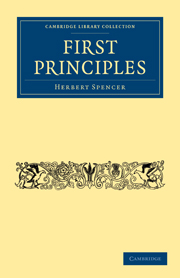Book contents
- Frontmatter
- PREFACE
- Contents
- PART I THE UNKNOWABLE
- PART II LAWS OF THE KNOWABLE
- I LAWS IN GENERAL
- II THE LAW OF EVOLUTION
- III THE LAW OF EVOLUTION (CONTINUED)
- IV THE CAUSES OF EVOLUTION
- V SPACE, TIME, MATTER, MOTION, AND FORCE
- VI THE INDESTRUCTIBILITY OF MATTER
- VII THE CONTINUITY OF MOTION
- VIII THE PERSISTENCE OF FORCE
- IX THE CORRELATION AND EQUIVALENCE OF FORCES
- X THE DIRECTION OF MOTION
- XI THE RHYTHM OF MOTION
- XII THE CONDITIONS ESSENTIAL TO EVOLUTION
- XIII THE INSTABILITY OF THE HOMOGENEOUS
- XIV THE MULTIPLICATION OF EFFECTS
- XV DIFFERENTIATION AND INTEGRATION
- XVI EQUILIBRATION
- Frontmatter
- PREFACE
- Contents
- PART I THE UNKNOWABLE
- PART II LAWS OF THE KNOWABLE
- I LAWS IN GENERAL
- II THE LAW OF EVOLUTION
- III THE LAW OF EVOLUTION (CONTINUED)
- IV THE CAUSES OF EVOLUTION
- V SPACE, TIME, MATTER, MOTION, AND FORCE
- VI THE INDESTRUCTIBILITY OF MATTER
- VII THE CONTINUITY OF MOTION
- VIII THE PERSISTENCE OF FORCE
- IX THE CORRELATION AND EQUIVALENCE OF FORCES
- X THE DIRECTION OF MOTION
- XI THE RHYTHM OF MOTION
- XII THE CONDITIONS ESSENTIAL TO EVOLUTION
- XIII THE INSTABILITY OF THE HOMOGENEOUS
- XIV THE MULTIPLICATION OF EFFECTS
- XV DIFFERENTIATION AND INTEGRATION
- XVI EQUILIBRATION
Summary
§ 35. We have seen that intellectual advance has been dual—has been towards the establishment of both a positively unknown and a positively known. In making ever more certain the inaccessibility of one kind of truth, experience has made ever more certain the accessibility of another kind. The differentiation of the knowable from the unknowable, is shown as much in the reduction of the one to perfect clearness, as in the reduction of the other to impenetrable mystery. Progressing enlightenment discloses a definite limit to human intelligence; and while all which lies on the other side of the limit, is, with increasing distinctness, seen to transcend our finite faculties, it grows more and more obvious that all which lies on this side of the limit may become an indisputable possession.
To speak specifically—it has been shown that though we can never learn the nature of that which is manifested to us, we are daily learning more completely the order of its manifestations. We are conscious of effects produced in us by something separate from ourselves. The effects of which we are conscious—the changes of consciousness which make up our mental life, we ascribe to the forces of an external world. The intrinsic character of these forces—of this external world—of that which underlies all appearances, we find inscrutable; as is also the internal something whose changes constitute consciousness.
- Type
- Chapter
- Information
- First Principles , pp. 127 - 145Publisher: Cambridge University PressPrint publication year: 2009First published in: 1862



